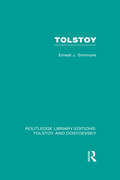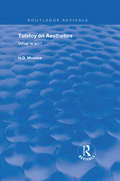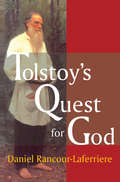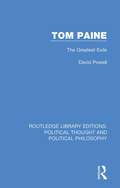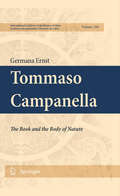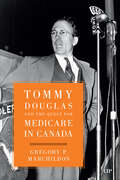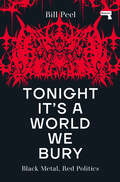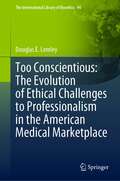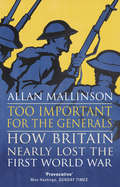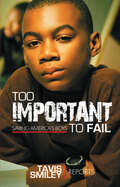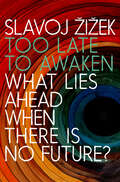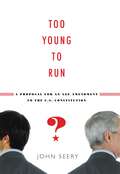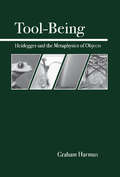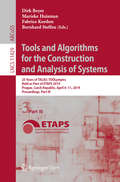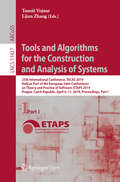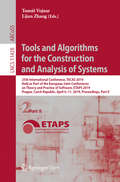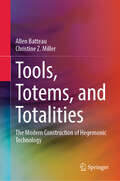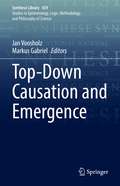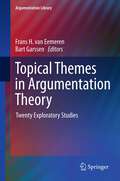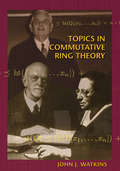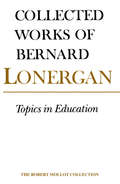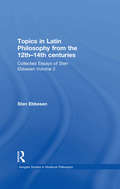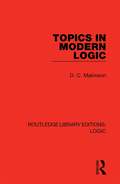- Table View
- List View
Tolstoy (Routledge Library Editions: Tolstoy and Dostoevsky)
by Ernest Joseph SimmonsTolstoy’s fame as one of the world’s greatest novelists has never been in doubt, but the importance of his views on the social, moral and religious issues of his time is not so widely recognised. This study, first published in 1973, presents an introduction to the historical and cultural background of Tolstoy’s lifetime, then going on to consider the major events of his developing personality as a writer and reformer. As well as considering the famous novels and literary criticism, Simmons treats his educational theories and practice, famine relief work, spiritual crises and religious, social and moral beliefs, as reflected in controversial writings such as What I Believe, What Then Must We Do? and The Kingdom of God Is Within You. He also investigates Tolstoy’s involvement in government, war and revolution, and the relevance of his reformist views in the contemporary world.
Tolstoy on Aesthetics: What is Art? (Routledge Revivals)
by H.O. MounceThis title was first published in 2001: Tolstoy's view of art is discussed in most courses in aesthetics, particularly his main text What is Art? He believed that the importance of art lies not in its purely aesthetic qualities but in its connection with life, and that art becomes decadent where this connection is lost. This view has often been misconceived and its strength overlooked. This book presents a clear exposition of Tolstoy's What is Art?, highlighting the value and importance of Tolstoy's views in relation to aesthetics. Mounce considers the problems which exercised Tolstoy and explains their fundamental importance in contemporary disputes. Having viewed these problems of aesthetics as they arise in a classic work, Howard Mounce affords readers fresh insights not simply into the problems of aesthetics themselves, but also into their contemporary treatment. Students and interested readers of aesthetics and philosophy, as well as those exploring the works of Tolstoy in literature, will find this book of particular interest and will discover that reading What is Art? with attention, affords something of the excitement found in removing the grime from an oil painting - gradually from underneath there appears an authentic masterpiece.
Tolstoy's Quest for God
by Daniel Rancour-LaferriereThe religious dimension of Tolstoy's life is usually associated with his later years following his renunciation of art. In this volume, Daniel Rancour-Laferriere demonstrates instead that Tolstoy was preoccupied with a quest for God throughout all of his adult life. Although renowned as the author of War and Peace, Anna Karenina, The Death of Ivan Ilych, and other literary works, and for his activism on behalf of the poor and the downtrodden of Russia, Tolstoy himself was concerned primarily with achieving personal union with God.Tolstoy suffered from periodic bouts of depression which brought his creative life to a standstill, and which intensified his need to find comfort in the embrace of a personal God. At times he was in such psychic pain he wanted to die. Yet Tolstoy felt that he deserved to suffer, and he learned to welcome suffering in masochistic fashion. Rancour-Laferriere locates the psychological underpinnings of Tolstoy's suffering in a bipolar illness that led him actively to seek suffering and self-humiliation in the Russian tradition of holy foolishness. With voluntary suffering, and Jesus Christ as his model, Tolstoy advocated nonresistance to evil, and in his daily life he strove never to return evil actions or words with physical or verbal resistance. On the other hand, being bipolar, Tolstoy in some situations would drift in a manic direction, indulging in delusions of grandeur. Indeed, the aging Tolstoy occasionally went so far as to equate himself with God, as can be seen from his diaries and personal correspondence.The pantheistic world view which Tolstoy achieved at the end of his life meant that God was within himself and within all people and all things in the entire universe. By this time Tolstoy was also utilizing images of a mother to represent his God. With this essentially maternal God so conveniently available, there was nowhere Tolstoy could be without Her. For, in the end, Tolstoy's quest for God was a
Tom Paine: The Greatest Exile (Routledge Library Editions: Political Thought and Political Philosophy #47)
by David PowellFirst published in 1985. In the late autumn of 1774 at the age of 37 Tom Paine arrived in Philadelphia. Eighteen months later he had established himself as a seminal figure in the Independence movement. It was the start of a career in which he became the first US Secretary of State for Foreign Affairs; was outlawed from England by Pitt for the publication of the second part of the Rights of Man; delivered a final plea for the life of Louis XVI in the National Convention of 1794; was imprisoned in the Luxembourg, and sentenced to death by Robespierre. After a sad and lonely death in New Rochelle Cobbett brought back his bones to England: ‘to light a taper for liberty.’ Yet Paine remains a man without a past; a man who seemingly burst on the world scene as a full-blown radical at 37 years of age. No one had attempted to explore and interpret the critical, shaping influences of his early and middle life. Yet such background is crucial to explaining all the rest. Without a clear understanding of his Quaker inheritance; of his childhood years in Thetford; of his early philosophical and political apprenticeship in London; and of the six formative years he spent at Lewes, the later man and his radicalism are totally incomprehensible. Thus, the author’s objective is to place Paine in his times; to interpret the evolution of his political, social and theological ideas. Paine is little more than a cardboard cut-out moving through history in the majority of biographies that have already been published. This book sees the world through Paine’s own eyes and provides a human interpretation not only of ‘the Age of Revolution’ but also of ‘the maker of revolutions’ himself. To Napoleon, Paine was the man to whom: ‘a statue in gold should be erected in every town’; to Theodore Roosevelt he was ‘that filthy little atheist’; to Michael Foot: ‘the greatest exile that has ever left England’s shores.’ To understand the thinking of a man who can provoke such reactions, it is necessary to understand both the man and the times through which he lived. This title will be of great interest to students of history, politics, and philosophy.
Tommaso Campanella
by Germana ErnstA friend of Galileo and author of the renowned utopia The City of the Sun, Tommaso Campanella (Stilo, Calabria,1568- Paris, 1639) is one of the most significant and original thinkers of the early modern period. His philosophical project centred upon the idea of reconciling Renaissance philosophy with a radical reform of science and society. He produced a complex and articulate synthesis of all fields of knowledge - including magic and astrology. During his early formative years as a Dominican friar, he manifested a restless impatience towards Aristotelian philosophy and its followers. As a reaction, he enthusiastically embraced Bernardino Telesio's view that knowledge could only be acquired through the observation of things themselves, investigated through the senses and based on a correct understanding of the link between words and objects. Campanella's new natural philosophy rested on the principle that the books written by men needed to be compared with God's infinite book of nature, allowing them to correct the mistakes scattered throughout the human 'copies' which were always imperfect, partial and liable to revisions. It is in the light of these principles that he defended Galileo's right to read the book of nature while denouncing the mistake of those - be they Aristotelian philosophers or theologians - who wanted to stop him from carrying on his natural investigations. However, Campanella maintained that the book of nature, far from being written in mathematical characters, was a living organism in which each natural being was endowed with life and a degree of sensibility that was appropriate for its preservation and propagation. Nature as a whole was an organism in which each single part was directed towards the common good. This is the reason why Campanella thought that nature had to be regarded as an ideal model for any political organisation. Political structures were often ruled by injustice and violence precisely because they had departed from that natural model. This book charts Campanella's intellectual life by showing the origin, development and persistence of some of the fundamental tenets of his thought.
Tommy Douglas and the Quest for Medicare in Canada
by Gregory MarchildonHow and why was universal health coverage implemented so early in a poverty-stricken province in Canada? Why was its design so faithfully replicated in the national standards that ultimately shaped Medicare across the rest of Canada? Seeking to answer these questions, Tommy Douglas and the Quest for Medicare in Canada explores the history of universal health care through the life of Canadian politician Tommy Douglas, identifying the pivotal moments and decisions that led to the establishment of Medicare in Canada. The book traces the origins of Medicare back to the 1930s Depression and its devastating impact on the Prairie populations. Marchildon examines how Tommy Douglas and a new generation of reformers, radicalized by the Depression, prioritized socialized health care. The book reveals how, as the provincial party leader, Douglas leveraged support from both local and external allies to rapidly implement universal hospital insurance and lay the groundwork for a new health system. Despite strong opposition from physician and business lobbies, Douglas continued to pressure the government for federal cost-sharing of universal health coverage. Drawing on archival sources including speeches, television broadcasts, and cabinet documents, Tommy Douglas and the Quest for Medicare in Canada illuminates how Douglas’s vision, leadership, and coalition-building among unions were crucial to the successful establishment of Medicare in Canada.
Tonight It’s a World We Bury: Black Metal, Red Politics
by Bill PeelTonight It&’s a World We Bury explores a range of tendencies central to black metal and uncovers their potential as critiques of capitalism.Tonight It's a World We Bury is a radical re-writing of the history and politics of black metal music.Challenging the commonly-held perception that black metal is a genre of the right — full of wannabe Vikings, Nazis, skinheads and other unsavoury characters — Tonight It's a World We Bury looks at an array of black metal artists to re-affirm the genre as radically anticapitalist, revolutionary and left-wing.Utilizing an eclectic range of black metal bands, including Darkthrone, Burzum, Liturgy and Deathspell Omega, and taking in the works of Marx, Nietzsche, Deleuze and more, Tonight It's a World We Bury is a book on black metal like no other.
Too Conscientious: The Evolution of Ethical Challenges to Professionalism in the American Medical Marketplace (The International Library of Bioethics #94)
by Douglas E. LemleyThis book addresses the fundamental conflict of interest that physicians face in their daily work lives between the ethics of proper medical care versus the demands of standard business practices. However, unlike other books of this sort, this one places direct responsibility for this ethical dilemma upon the shoulders of physicians themselves. Taking ethical, legal, and business perspectives into account, the book traces the historically evolving response of American physicians to ever-increasing business interests within the profession. These financial concerns now have become intrinsic not only to the practice of medicine but seemingly also to the character of a growing segment of its practitioners. The book offers a plea for a change to a more socialized healthcare system as used in other advanced nations.
Too Important for the Generals: Losing and Winning the First World War
by Allan Mallinson‘War is too important to be left to the generals’ snapped future French prime minister Georges Clemenceau on learning of yet another bloody and futile offensive on the Western Front. One of the great questions in the ongoing discussions and debate about the First World War is why did winning take so long and exact so appalling a human cost? After all this was a fight that, we were told, would be over by Christmas. Now, in his major new history, Allan Mallinson, former professional soldier and author of the acclaimed 1914: Fight the Good Fight, provides answers that are disturbing as well as controversial, and have a contemporary resonance. He disputes the growing consensus among historians that British generals were not to blame for the losses and setbacks in the ‘war to end all wars’ – that, given the magnitude of their task, they did as well anyone could have. He takes issue with the popular view that the ‘amateur’ opinions on strategy of politicians such as Lloyd George and, especially, Winston Churchill, prolonged the war and increased the death toll. On the contrary, he argues, even before the war began Churchill had a far more realistic, intelligent and humane grasp of strategy than any of the admirals or generals, while very few senior officers – including Sir Douglas Haig – were up to the intellectual challenge of waging war on this scale. And he repudiates the received notion that Churchill’s stature as a wartime prime minister after 1940 owes much to the lessons he learned from his First World War ‘mistakes’ – notably the Dardanelles campaign – maintaining that in fact Churchill’s achievement in the Second World War owes much to the thwarting of his better strategic judgement by the ‘professionals’ in the First – and his determination that this would not be repeated.Mallinson argues that from day one of the war Britain was wrong-footed by absurdly faulty French military doctrine and paid, as a result, an unnecessarily high price in casualties. He shows that Lloyd George understood only too well the catastrophically dysfunctional condition of military policy-making and struggled against the weight of military opposition to fix it. And he asserts that both the British and the French failed to appreciate what the Americans’ contribution to victory could be – and, after the war, to acknowledge fully what it had actually been.
Too Important to Fail
by Tavis SmileyToo Important to Fail: Saving America’s Boys is the companion volume to TAVIS SMILEY REPORTS PBS special which is funded by the Corporation for Public Broadcasting as part of its American Graduate: Let’s Make It Happen initiative. It examines an undeclared crisis in America—the staggering dropout rate among young black males. In countless urban schools the graduation rate has plummeted to less than 20% and nationwide fewer than 50% of young black males will graduate from high school. Low graduation rates combined with disproportionate rates of suspensions, expulsion and young black males assigned to special education classes, fuel this state of emergency. Tavis Smiley’s candid conversations in Los Angeles, Chicago, Philadelphia and Oakland with frontline experts and educators, detention center administrators and the boys themselves urges viewers to ponder the societal and economic cost of losing another generation of uneducated young black males to lifetimes of prison and poverty. This volume picks up where the special leaves off with expanded discussion, dot-connecting data and real life examples of the information and resources needed to harness our frustration and concern into collective and effective action. The e-book contains an extensive resource guide that lists 125 organizations who have a stake in solving this monumental challenge.
Too Late to Awaken: What Lies Ahead When There Is No Future
by Slavoj ZizekThe "most dangerous philosopher in the West" returns with a rousing and counterintuitive analysis of our global predicament.Žižek's most urgent and accessible book yet asks us all to imagine that catastrophe is a foregone conclusion—so that we can actually save the world.We hear all the time that we're moments from doomsday. Around us, crises interlock and escalate, threatening our collective survival: Russia's invasion of Ukraine, with its rising risk of nuclear warfare, is taking place against a backdrop of global warming, ecological breakdown, and widespread social and economic unrest. Protestors and politicians repeatedly call for action, but still we continue to drift towards disaster. We need to do something. But what if the only way for us to prevent catastrophe is to assume that it has already happened-to accept that we're already five minutes past zero hour?Too Late to Awaken sees Slavoj Žižek forge a vital new space for a radical emancipatory politics that could avert our course to self-destruction. He illuminates why the liberal Left has so far failed to offer this alternative, and exposes the insidious propagandism of the fascist Right, which has appropriated and manipulated once-progressive ideas. Pithy, urgent, gutting and witty Žižek&’s diagnosis reveals our current geopolitical nightmare in a startling new light, and shows how, in order to change our future, we must first focus on changing the past.
Too Young to Run?: A Proposal for an Age Amendment to the U.S. Constitution
by John SeeryUnder the Constitution of the United States, those with political ambitions who aspire to serve in the federal government must be at least twenty-five to qualify for membership in the House of Representatives, thirty to run for the Senate, and thirty-five to become president. What is the justification for these age thresholds, and is it time to consider changing them? In this provocative and lively book, John Seery presents the case for a constitutional amendment to lower the age barrier to eighteen, the same age at which citizens become eligible to vote. He divides his argument into three sections. In a historical chapter, he traces the way in which the age qualifications became incorporated in the Constitution in the first place. In a theoretical chapter, he analyzes the normative arguments for office eligibility as a democratic right and liberty. And in a political chapter, he ruminates about the real-world consequences of passing such an amendment and the prospects for its passage. Finally, in a postscript, he argues that younger citizens in particular ought to be exposed to this fundamental issue in civics.
Too Young to Run?: A Proposal for an Age Amendment to the U.S. Constitution
by John SeeryUnder the Constitution of the United States, those with political ambitions who aspire to serve in the federal government must be at least twenty-five to qualify for membership in the House of Representatives, thirty to run for the Senate, and thirty-five to become president. What is the justification for these age thresholds, and is it time to consider changing them? In this provocative and lively book, John Seery presents the case for a constitutional amendment to lower the age barrier to eighteen, the same age at which citizens become eligible to vote. He divides his argument into three sections. In a historical chapter, he traces the way in which the age qualifications became incorporated in the Constitution in the first place. In a theoretical chapter, he analyzes the normative arguments for office eligibility as a democratic right and liberty. And in a political chapter, he ruminates about the real-world consequences of passing such an amendment and the prospects for its passage. Finally, in a postscript, he argues that younger citizens in particular ought to be exposed to this fundamental issue in civics.
Tool-Being
by Graham HarmanTool-Being offers a new assessment of Martin Heidegger's famous tool-analysis, and with it, an audacious reappraisal of Heidegger's legacy to twenty-first-century philosophy.Every reader of Being and Time is familiar with the opposition between readiness-to-hand (Zuhandenheit) and presence-at-hand (Vorhandenheit), but commentators usually follow Heidegger's wishes in giving this distinction a limited scope, as if it applied only to tools in a narrow sense. Graham Harman contests Heidegger's own interpretation of tool-being, arguing that the opposition between tool and broken tool is not merely a provisional stage in his philosophy, but rather its living core. The extended concept of tool-being developed here leads us not to a theory of human practical activity but to an ontology of objects themselves.Tool-Being urges a fresh and concrete research into the secret contours of objects. Written in a lively and colorful style, it will be of great interest to anyone intrigued by Heidegger and anyone open to new trends in present-day philosophy.
Tools and Algorithms for the Construction and Analysis of Systems: 25 Years of TACAS: TOOLympics, Held as Part of ETAPS 2019, Prague, Czech Republic, April 6–11, 2019, Proceedings, Part III (Lecture Notes in Computer Science #11429)
by Fabrice Kordon Marieke Huisman Bernhard Steffen Dirk BeyerThis book is Open Access under a CC BY licence. This book, LNCS 11429, is part III of the proceedings of the 25th International Conference on Tools and Algorithms for the Construction and Analysis of Systems, TACAS 2019, which took place in Prague, Czech Republic, in April 2019, held as part of the European Joint Conferences on Theory and Practice of Software, ETAPS 2019. It's a special volume on the occasion of the 25 year anniversary of TACAS.
Tools and Algorithms for the Construction and Analysis of Systems: 25 Years of TACAS: TOOLympics, Held as Part of ETAPS 2019, Prague, Czech Republic, April 6–11, 2019, Proceedings, Part III (Lecture Notes in Computer Science #11429)
by Fabrice Kordon Marieke Huisman Bernhard Steffen Dirk BeyerThis book is Open Access under a CC BY licence. This book, LNCS 11429, is part III of the proceedings of the 25th International Conference on Tools and Algorithms for the Construction and Analysis of Systems, TACAS 2019, which took place in Prague, Czech Republic, in April 2019, held as part of the European Joint Conferences on Theory and Practice of Software, ETAPS 2019. It's a special volume on the occasion of the 25 year anniversary of TACAS.
Tools and Algorithms for the Construction and Analysis of Systems: 25th International Conference, TACAS 2019, Held as Part of the European Joint Conferences on Theory and Practice of Software, ETAPS 2019, Prague, Czech Republic, April 6–11, 2019, Proceedings, Part I (Lecture Notes in Computer Science #11427)
by Tomáš Vojnar Lijun ZhangThis book is Open Access under a CC BY licence. The LNCS 11427 and 11428 proceedings set constitutes the proceedings of the 25th International Conference on Tools and Algorithms for the Construction and Analysis of Systems, TACAS 2019, which took place in Prague, Czech Republic, in April 2019, held as part of the European Joint Conferences on Theory and Practice of Software, ETAPS 2019. The total of 42 full and 8 short tool demo papers presented in these volumes was carefully reviewed and selected from 164 submissions. The papers are organized in topical sections as follows: Part I: SAT and SMT, SAT solving and theorem proving; verification and analysis; model checking; tool demo; and machine learning. Part II: concurrent and distributed systems; monitoring and runtime verification; hybrid and stochastic systems; synthesis; symbolic verification; and safety and fault-tolerant systems.
Tools and Algorithms for the Construction and Analysis of Systems: 25th International Conference, TACAS 2019, Held as Part of the European Joint Conferences on Theory and Practice of Software, ETAPS 2019, Prague, Czech Republic, April 6–11, 2019, Proceedings, Part II (Lecture Notes in Computer Science #11428)
by Tomáš Vojnar Lijun ZhangThis book is Open Access under a CC BY licence. The LNCS 11427 and 11428 proceedings set constitutes the proceedings of the 25th International Conference on Tools and Algorithms for the Construction and Analysis of Systems, TACAS 2019, which took place in Prague, Czech Republic, in April 2019, held as part of the European Joint Conferences on Theory and Practice of Software, ETAPS 2019. The total of 42 full and 8 short tool demo papers presented in these volumes was carefully reviewed and selected from 164 submissions. The papers are organized in topical sections as follows: Part I: SAT and SMT, SAT solving and theorem proving; verification and analysis; model checking; tool demo; and machine learning. Part II: concurrent and distributed systems; monitoring and runtime verification; hybrid and stochastic systems; synthesis; symbolic verification; and safety and fault-tolerant systems.
Tools, Totems, and Totalities: The Modern Construction of Hegemonic Technology
by Allen Batteau Christine Z. MillerThis book provides a critical perspective on technology, answering the questions of why technologies often disappoint. It takes a sociotechnical and historical perspective on technology, as developed by an engineer–anthropologist and a design anthropologist, to answer questions not only about why modern societies have great expectations of technology, but also of why these technologies often fail to meet expectations. Modern societies often search for technological solutions (“technofixes”) to what are institutional problems, which include border crossings or urban mobility, or improvements in productivity or improved communication. It is disappointing when technofixes, whether border walls or driverless cars or social media, fail to live up to their promises of greater personal autonomy (such as afforded by driverless cars) or improved social harmony through social media. Examining technology from the perspectives of instrumentality (“tools”), identity (“totems”), and world-defining systems (“totalities”) develops a comprehensive perspective that is at once historically informed and cross-culturally accurate. Although instrumentality is obvious and is at the core of any understanding of technology, identity is less so; yet many modern “tribes” create their identity in terms of technological objects and systems, whether transport systems (cars and airplanes) or social media or weapons (guns). Further, modern technologies span the globe, so that they exert imperative coordination over distant populations; the use of cell phones around the world is testimony to this fact. Such a critical perspective on technology can be useful in policy discussions of numerous issues affecting contemporary institutions.
Top-Down Causation and Emergence (Synthese Library #439)
by Markus Gabriel Jan VoosholzThis book presents the latest research, conducted by leading philosophers and scientists from various fields, on the topic of top-down causation. The chapters combine to form a unique, interdisciplinary perspective, drawing upon George Ellis's extensive research and novel perspectives on topics including downwards causation, weak and strong emergence, mental causation, biological relativity, effective field theory and levels in nature. The collection also serves as a Festschrift in honour of George Ellis' 80th birthday. The extensive and interdisciplinary scope of this book makes it vital reading for anyone interested in the work of George Ellis and current research on the topics of causation and emergence.
Topical Themes in Argumentation Theory
by Frans H. van Eemeren Bart GarssenTopical Themes in Argumentation Theory brings together twenty exploratory studies on important subjects of research in contemporary argumentation theory. The essays are based on papers that were presented at the 7th Conference of the International Society for the Study of Argumentation (ISSA) in Amsterdam in June 2010. They give an impression of the nature and the variety of the kind of research that has recently been carried out in the study of argumentation.The volume starts with three essays that provide stimulating theoretical perspectives on argumentation. Subsequently, some views are explained on the intriguing topics of 'dissensus' and 'deep disagreement'. After a discussion of three different approaches to the treatment of types of argumentation some classical themes from antique argumentation theory are revisited. The new research area of visual argumentation is explored in the next part. The volume concludes with three reports of experimental studies concerning argumentative discourse. The volume starts with three essays that provide stimulating theoretical perspectives on argumentation. Subsequently, some views are explained on the intriguing topics of 'dissensus' and 'deep disagreement'. After a discussion of three different approaches to the treatment of types of argumentation some classical themes from antique argumentation theory are revisited. The new research area of visual argumentation is explored in the next part. The volume concludes with three reports of experimental studies concerning argumentative discourse. The volume starts with three essays that provide stimulating theoretical perspectives on argumentation. Subsequently, some views are explained on the intriguing topics of 'dissensus' and 'deep disagreement'. After a discussion of three different approaches to the treatment of types of argumentation some classical themes from antique argumentation theory are revisited. The new research area of visual argumentation is explored in the next part. The volume concludes with three reports of experimental studies concerning argumentative discourse.
Topics in Commutative Ring Theory
by John J. WatkinsTopics in Commutative Ring Theory is a textbook for advanced undergraduate students as well as graduate students and mathematicians seeking an accessible introduction to this fascinating area of abstract algebra. Commutative ring theory arose more than a century ago to address questions in geometry and number theory. A commutative ring is a set-such as the integers, complex numbers, or polynomials with real coefficients--with two operations, addition and multiplication. Starting from this simple definition, John Watkins guides readers from basic concepts to Noetherian rings-one of the most important classes of commutative rings--and beyond to the frontiers of current research in the field. Each chapter includes problems that encourage active reading--routine exercises as well as problems that build technical skills and reinforce new concepts. The final chapter is devoted to new computational techniques now available through computers. Careful to avoid intimidating theorems and proofs whenever possible, Watkins emphasizes the historical roots of the subject, like the role of commutative rings in Fermat's last theorem. He leads readers into unexpected territory with discussions on rings of continuous functions and the set-theoretic foundations of mathematics. Written by an award-winning teacher, this is the first introductory textbook to require no prior knowledge of ring theory to get started. Refreshingly informal without ever sacrificing mathematical rigor, Topics in Commutative Ring Theory is an ideal resource for anyone seeking entry into this stimulating field of study.
Topics in Education: The Cincinnati Lectures of 1959 on the Philosophy of Education, Volume 10
by Bernard Lonergan Robert Doran, S.J. Frederick Crowe, S.J.Bernard Lonergan devoted much of his life's work to developing a generalized method of inquiry, an integrated view which would overcome the fragmentation of knowledge in our time. In Topics in Education Lonergan adapts that concern to the practical needs of educators. Traditionalist and modernist notions of education are both criticized. Lonergan attempts to work out, in the context of the human good and the 'new learning,' the rudiments of a philosophy of education based on his well-known discovery of norms in the unfolding of intelligent, reasonable, and responsible consciousness. He explores how the scientific revolution has changed ways of understanding reality, and examines the implications of this revolution for education. Topics in Education, the first publication of his 1959 lectures, follows Lonergan on his early explorations of human development, studies the theories of Jean Piaget and others, and concludes with his own original ideas in the realms of ethics, art, and history.
Topics in Latin Philosophy from the 12th–14th centuries: Collected Essays of Sten Ebbesen Volume 2 (Ashgate Studies in Medieval Philosophy)
by Sten EbbesenSten Ebbesen has contributed many works in the field of ancient and medieval philosophy over decades of dedicated research. His crisp and lucid style and his philosophical penetration of often difficult concepts and issues is both clear and intellectually impressive. Ashgate is proud to present this thematically arranged three volume set of his collected essays, each thoroughly revised and updated. Volume Two: Topics in Latin Philosophy from the 12th -14th Centuries explores issues in medieval philosophy from the time nominalists and other schools competed in twelfth-century Paris to the mature scholasticism of Boethius of Dacia, Radulphus Brito and other 'modist' thinkers of the late thirteenth century and, finally, the new nominalism of John Buridan in the fourteenth century.
Topics in Modern Logic (Routledge Library Editions: Logic)
by D. C. MakinsonOriginally published in 1973. This book is directed to the student of philosophy whose background in mathematics is very limited. The author strikes a balance between material of a philosophical and a formal kind, and does this in a way that will bring out the intricate connections between the two. On the formal side, he gives particular care to provide the basic tools from set theory and arithmetic that are needed to study systems of logic, setting out completeness results for two, three, and four valued logic, explaining concepts such as freedom and bondage in quantificational logic, describing the intuitionistic conception of the logical operators, and setting out Zermelo's axiom system for set theory. On the philosophical side, he gives particular attention to such topics as the problem of entailment, the import of the Löwenheim-Skolem theorem, the expressive powers of quantificational logic, the ideas underlying intuitionistic logic, the nature of set theory, and the relationship between logic and set theory. There are exercises within the text, set out alongside the theoretical ideas that they involve.
